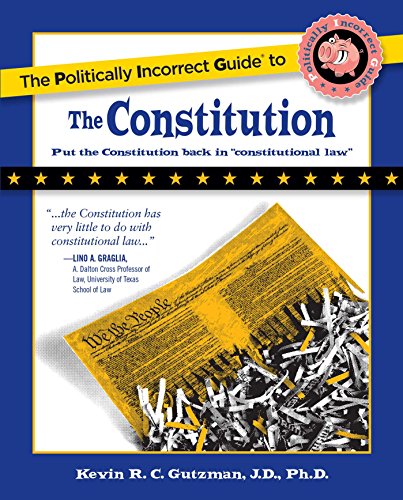Even as calls for nullification of proposed federal health care mandates have intensified on the state level, an almost hysterical effort has arisen to discredit such measures, and paint them as part of an obsolete theory with no bearing on modern politics.
Regardless of its logical descent from our most basic founding principle, that governments derive their just powers from the consent of the governed, nullification simply doesn’t work, critics say.
Or does it?
 The Politically Incorr...
Best Price: $1.51
Buy New $8.71
(as of 06:15 UTC - Details)
The Politically Incorr...
Best Price: $1.51
Buy New $8.71
(as of 06:15 UTC - Details)
While it’s true that our system of checks and balances has been weakened substantially over the years, federalism itself has not. Divided sovereignty remains as viable a structure of government as it was the day our Constitution was ratified. Perhaps a better question is: Can nullification succeed peacefully?
Of course! It already has. For proof, one need look no further than the truth behind a favorite parable of establishment statists, the Nullification Crisis of 1832–33.
 The Politically Incorr...
Best Price: $3.55
Buy New $8.80
(as of 02:20 UTC - Details)
The Politically Incorr...
Best Price: $3.55
Buy New $8.80
(as of 02:20 UTC - Details)
Over the years, that crucial victory for the sovereign states has been converted into a cautionary tale by those who wish to discourage taxpayers from ever questioning their federal masters. So distorted is the history that a recent article on modern nullification efforts in the Nashville City Paper declared.
In the Nullification Crisis of the 1830s, South Carolina passed a law nullifying federal tariffs, but the state backed down after President Andrew Jackson sent Navy warships to the Charleston harbor.
The only problem with that story is it never happened.
After nullifying the so-called Tariff of Abominations in late 1832, the citizens of South Carolina began making serious preparations to defend themselves with deadly force against any attempt by federal agents to collect the hated tax. What followed was a tense standoff between President Jackson and a relatively small group of determined citizens, that could easily have resulted in secession or war.
But those citizens refused to be intimidated by Jackson’s repeated threats of violence, and they certainly didn’t surrender to warships in Charleston Harbor.
As Wikipedia admits, it was not until the end of February 1833, when “both a Force Bill, authorizing the President to use military force against South Carolina, and a new negotiated tariff satisfactory to South Carolina [emphasis added] were passed by Congress,” that “the South Carolina convention reconvened and repealed its Nullification Ordinance.” From that point on, right up until the War Between the States, the tariff rate declined steadily.
January 9, 2010





